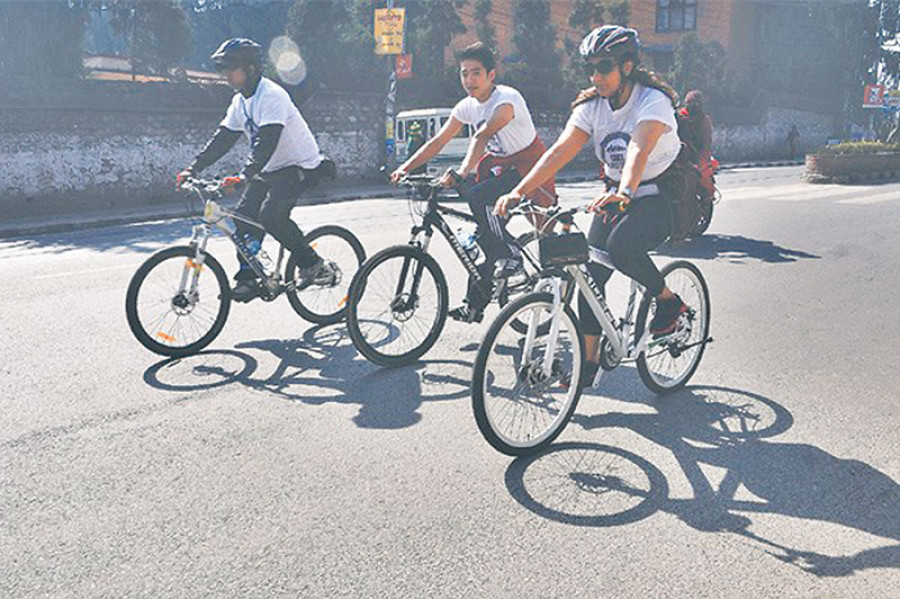Opinion
Pedalling through perdition
Cycling could be the way to go for a cleaner and greener Kathmandu
Dipendra Gautam
It was a dark winter night, Taylor (my bicycle) and I were traveling back home from the chaotic downtown of Kathmandu. Suddenly, I fell down and rubbed my right cheek, which left my face scarred. In another situation, one motorcyclist tugged with Taylor coming at the front and nearly I fell down. Stories become tremendous once you start riding a zero carbon, eco-friendly mountain bike in Kathmandu’s chaos. Honking and disobeying lane discipline from the syndicate-laden vans, water supplying tankers, trippers, and especially imprecations coming from the motorcyclists are so discouraging that it makes you want to stop peddling and just let them go first. One should be intrepid to peddle in Kathmandu. As its pollution level is reaching at its peak every now and then, vehicles running on fossil fuels are contributing to the degradation at exponential rate every day. Aiming to respect the planet earth, I decided to commute with Taylor since last December and since have been sticking to this decision. In the last six months, my perception to the society has also changed gravely.
Top-down approach
Biking is seldom considered as a means of transport in most of the middle-income families. Thus, biking is a must for the have-nots and has become a tool of exercise for the haves in Nepal. Quite a few people also ride to pay tribute to mother nature as well, but the bitter fact is, they are only a few. Since December, I have attended at least a dozen of meetings on sustainability issues. Be it an environmental sustainability or sustainable structural engineering, most of the know-all people ride vehicles that run on fossil fuel. They talk big on changing habits but forget to change their vehicles. So much has been said or penned in papers to date but self-morphing is barely practiced.
During the last federal election, I read the election manifesto of the currently ruling party, which states that there would be a biking lane, at least in Lalitpur. It has been almost four months since the government has been formed, but nothing concrete has come out of it yet. If constructing biking lanes take a long time, marking a small area within the road pavement can be done in a few weeks of not in a couple of months. Prosperity does not come without sustainability and sustainability does not come without morphing individuals. And for this, the government has to take the first step. Inculcating the gravity behind the importance of biking should be the top priority of our times. Learning from Central and Northern Europe could be one majestic lesson. However, eco-friendly riding should be promoted from the government level rather than letting some I/NGOs to do the advocacy.
Make the switch
Apart from the environmentalists and conservationists, present day structural engineers have also transformed themselves into eco-friendly beings. To make it clear, after the evolution of sustainable structural engineering, a lot has been done to assure the preservation of ecosystem and environment. A recent research conducted in Nepal by our team has also proposed to go for ‘payment for ecosystem services’ (PES). PES should undoubtedly be the next avenue of any sort of construction. Here, the biggest issue is to start from an individual’s life. If we toddle with the concept of respect to the nature and accept everything’s existence, sustainability is not a far-fetched goal.
The feudal social structure, which demands a fossil-fuel vehicle to maintain the so called ‘status’ is the prime challenge in encouraging the young people to switch their commute system. Most of the youngsters who I have talked with assume that motorcycles and vehicles that run on fossil fuel are the signatures of their statuses, which is wrong. The long-sitting impressionist ideas are indispensable for today’s population; however, change is inevitable. The pedantic ideas of sustainability are on the rise, yet most of the lobbyists just do so to get the funding and then quit once their interests are met. To end this, it is about time we switched the government policies. For instance the bureaucrats, social icons, ministers, and other people can start biking when possible in order to lure the mass to swap their mode of commute.
Most of the people post the pictures of Dutch prime minister and so on to blame our government of being profligate; however, parsimony is not prevalent in commoners in noticeable scale either. Biking will reduce our gas dependency, which will also ultimately bring down the import. but more importantly, the residents of Kathmandu will get to breath fresh air. As a regular rider, I haven’t confronted with any difficulty even if the landscape is undulating. The academic sector where a great fraction of population is concentrated should now think of promoting cycling rather than vehicles that run on fossil-fuels. If the streets of Kathmandu is full of bikes rather than heavy motor vehicles, it would not only protect the ecosystem but also assure the longevity of heritage sites. Flora and fauna could be restored and Kathmandu could go green once again.




 13.16°C Kathmandu
13.16°C Kathmandu










